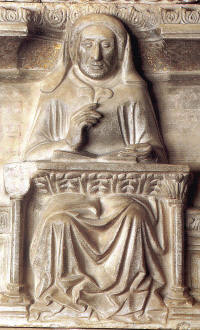Ad intelligentiam
sequendorum premittendum quoddam indubitatum, uidelicet quod princeps Romanus
potest sua castra et iurisdictiones et dignitates in feudum assignare et
conferre. Et tanta est in eo plenitudo potestatis quod legibus solutus
est ut ff. de legibus l.
 Princeps.
Et licet de plenitudine honestatis teneatur habere firmas concessiones
suas et non debeat uenire contra fidem precessorum suorum quia debet esse
cultor et auctor iusticie, ut in c. Si clientulus § Ecclesia
et in c.i. de natura feudi,
ubi dicit quod non potest disuestire sine causa quia fides est de iure
naturali, tamen si aliquod motiuum --- etiam leue --- mouet principem, de plenitudine
potestatis facere potest, quod ei libet, iuxta illud antiquum uerbum, si
libet, licet, ut dicta l. Princeps et C. eodem l. Digna uox ----
To
understand the following we must establish the indisputable: the Roman
prince can bestow and confer his fortresses, jurisdictions, and dignities as
fiefs. So great is his fullness of power that he is legibus solutus.
Although by fullness of honesty he is held to maintain his grants and not
contravene the promises of his predecessors, it is because he is the cultivator and
author of justice. Although the Liber feudorum states that the prince
cannot strip anyone of his fief because an oath is an institution of natural
law, nevertheless if the prince is moved by a reason, even a minor reason,
he can strip someone of his fief from his fullness of power because it
pleases him, according to Digna vox, if it pleases him, it is licit. Princeps.
Et licet de plenitudine honestatis teneatur habere firmas concessiones
suas et non debeat uenire contra fidem precessorum suorum quia debet esse
cultor et auctor iusticie, ut in c. Si clientulus § Ecclesia
et in c.i. de natura feudi,
ubi dicit quod non potest disuestire sine causa quia fides est de iure
naturali, tamen si aliquod motiuum --- etiam leue --- mouet principem, de plenitudine
potestatis facere potest, quod ei libet, iuxta illud antiquum uerbum, si
libet, licet, ut dicta l. Princeps et C. eodem l. Digna uox ----
To
understand the following we must establish the indisputable: the Roman
prince can bestow and confer his fortresses, jurisdictions, and dignities as
fiefs. So great is his fullness of power that he is legibus solutus.
Although by fullness of honesty he is held to maintain his grants and not
contravene the promises of his predecessors, it is because he is the cultivator and
author of justice. Although the Liber feudorum states that the prince
cannot strip anyone of his fief because an oath is an institution of natural
law, nevertheless if the prince is moved by a reason, even a minor reason,
he can strip someone of his fief from his fullness of power because it
pleases him, according to Digna vox, if it pleases him, it is licit.
|
 Princeps.
Et licet de plenitudine honestatis teneatur habere firmas concessiones
suas et non debeat uenire contra fidem precessorum suorum quia debet esse
cultor et auctor iusticie, ut in c. Si clientulus § Ecclesia
et in c.i. de natura feudi,
ubi dicit quod non potest disuestire sine causa quia fides est de iure
naturali, tamen si aliquod motiuum --- etiam leue --- mouet principem, de plenitudine
potestatis facere potest, quod ei libet, iuxta illud antiquum uerbum, si
libet, licet, ut dicta l. Princeps et C. eodem l. Digna uox ----
To
understand the following we must establish the indisputable: the Roman
prince can bestow and confer his fortresses, jurisdictions, and dignities as
fiefs. So great is his fullness of power that he is legibus solutus.
Although by fullness of honesty he is held to maintain his grants and not
contravene the promises of his predecessors, it is because he is the cultivator and
author of justice. Although the Liber feudorum states that the prince
cannot strip anyone of his fief because an oath is an institution of natural
law, nevertheless if the prince is moved by a reason, even a minor reason,
he can strip someone of his fief from his fullness of power because it
pleases him, according to Digna vox, if it pleases him, it is licit.
Princeps.
Et licet de plenitudine honestatis teneatur habere firmas concessiones
suas et non debeat uenire contra fidem precessorum suorum quia debet esse
cultor et auctor iusticie, ut in c. Si clientulus § Ecclesia
et in c.i. de natura feudi,
ubi dicit quod non potest disuestire sine causa quia fides est de iure
naturali, tamen si aliquod motiuum --- etiam leue --- mouet principem, de plenitudine
potestatis facere potest, quod ei libet, iuxta illud antiquum uerbum, si
libet, licet, ut dicta l. Princeps et C. eodem l. Digna uox ----
To
understand the following we must establish the indisputable: the Roman
prince can bestow and confer his fortresses, jurisdictions, and dignities as
fiefs. So great is his fullness of power that he is legibus solutus.
Although by fullness of honesty he is held to maintain his grants and not
contravene the promises of his predecessors, it is because he is the cultivator and
author of justice. Although the Liber feudorum states that the prince
cannot strip anyone of his fief because an oath is an institution of natural
law, nevertheless if the prince is moved by a reason, even a minor reason,
he can strip someone of his fief from his fullness of power because it
pleases him, according to Digna vox, if it pleases him, it is licit.